Across all states in the US, certain federal laws govern the need for rental and lease agreements. These contracts tend to include similar information to cover the most critical aspects of a lease and protect both parties involved. For the most part, these will include elements such as the identifying information of the landlord and the tenant, the details about the actual property, and any prohibited activities.
Likewise, it will also include information regarding any safety or health concerns. Finally, an Iowa lease agreement will always include specific details about the financial elements, such as the security deposit and rent, how they should be provided, and when.
Iowa Lease Agreement
A lease agreement in Iowa is a legal document that allows a current property owner to rent out several kinds of properties to a potential tenant in exchange for a specified monthly compensation.
The specific terms of these agreements are detailed in Chapter 562A (Uniform Residential Landlord and Tenant Law). Generally, this contract will be signed after meeting with the tenant and discussing the terms.
After examining different elements of the potential tenant’s past, such as their pay stubs, criminal background, and credit score, the landlord may offer a lease agreement in Iowa that specifies all the specific terms of the document. Once both parties sign the contract, the tenant has the lawful right to stay on the property during the specified time. Additionally, this type of legal contract can be utilized in residential or commercial situations. The tenant must pay the specified security deposit and the first month’s rent before moving in.
Iowa Lease Agreement Types
As mentioned, there are multiple kinds of lease agreements available in Iowa. These documents establish the terms and conditions of the tenant’s right to possess the property.
Here are some of the most frequently used subtypes:
Association of realtors

This is a standard rental agreement that is much more flexible than other rental contracts in Iowa. In this agreement, the time for tenancy is negotiable and can be changed. These negotiable terms allow for more specific time frames and could benefit both tenants and landlords. In Iowa, while allowing for both fixed-term and month-to-month periods, this agreement still includes all the standard information and conditions that any other lease agreement would contain.
Commercial
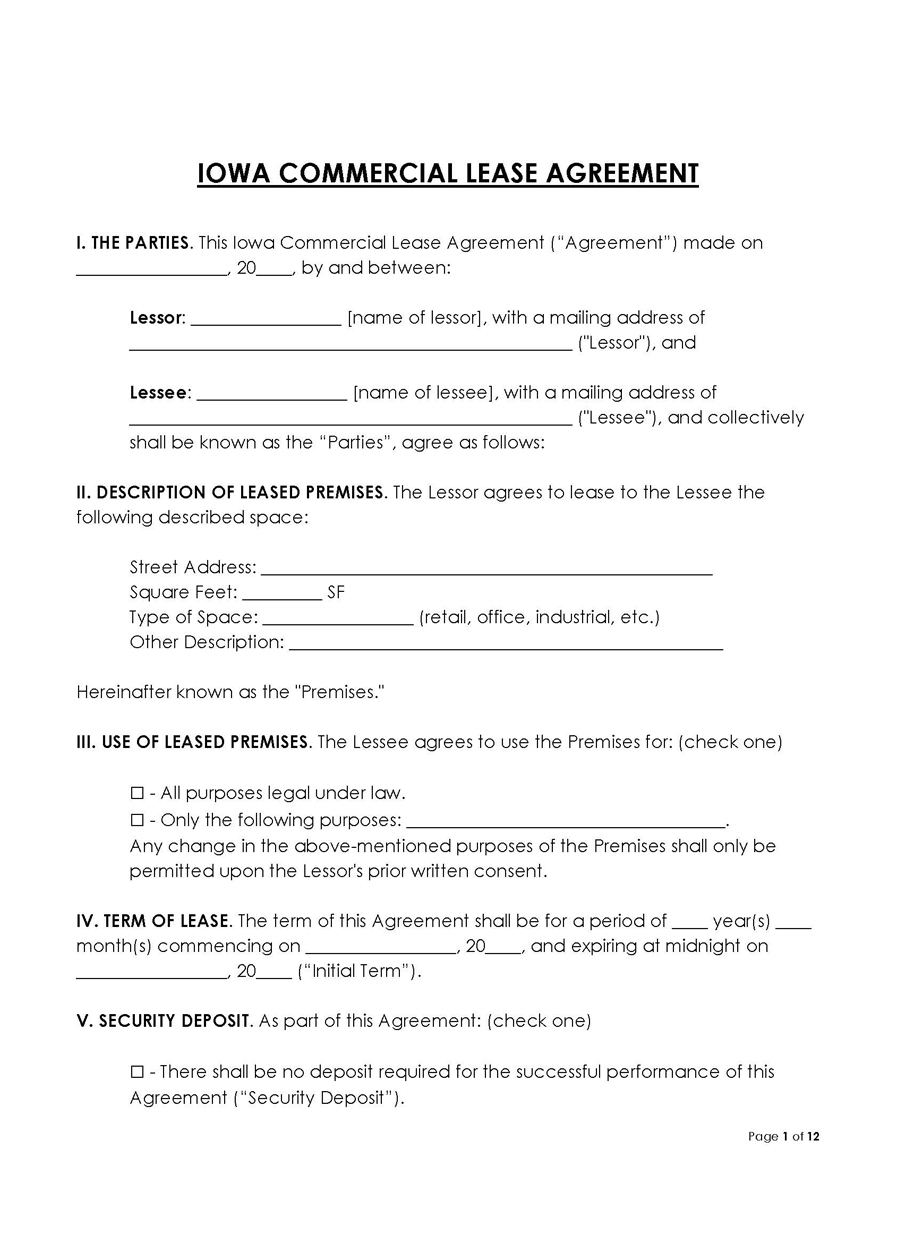
The commercial lease agreement is a remarkable document used to rent out primarily for business purposes. However, these commercial leases can be used for various spaces, such as offices, restaurants, or industrial buildings. These contracts should be signed, and the party can be held liable for maintaining the terms and conditions of the contract. These contracts tend to be longer, typically from three to five years. Likewise, they may also offer fewer protections to the tenant.
They must always contain all the details about the appropriate steps. This includes the time for the duration of the contract and all economic stipulations, such as monthly rent and security deposits. It should also specify whether any changes to the property itself are allowed to have the same effect.
Month-to-month lease agreement
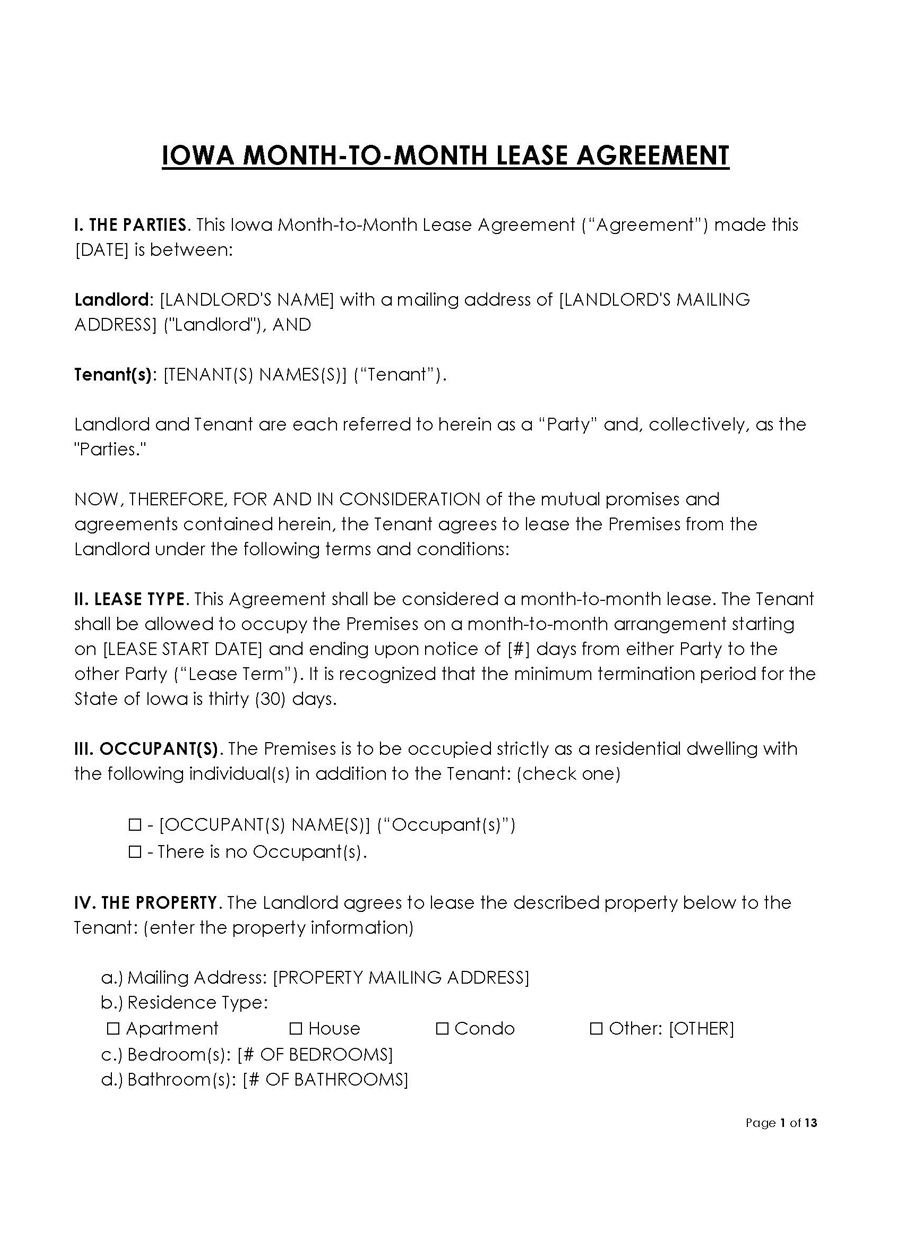
A month-to-month agreement is used for rental contracts that don’t have a fixed term but instead utilize a monthly renewal system. This allows both the tenant and the property owner to terminate the lease within 30 days and maintain a certain level of flexibility. Regardless, the same conditions are still applicable to the roles of tenant and landlord. Both parties may still be held liable for maintaining the terms of the agreement, according to the Uniform Residential Landlord and Tenant Act of Iowa.
Rent-to-own
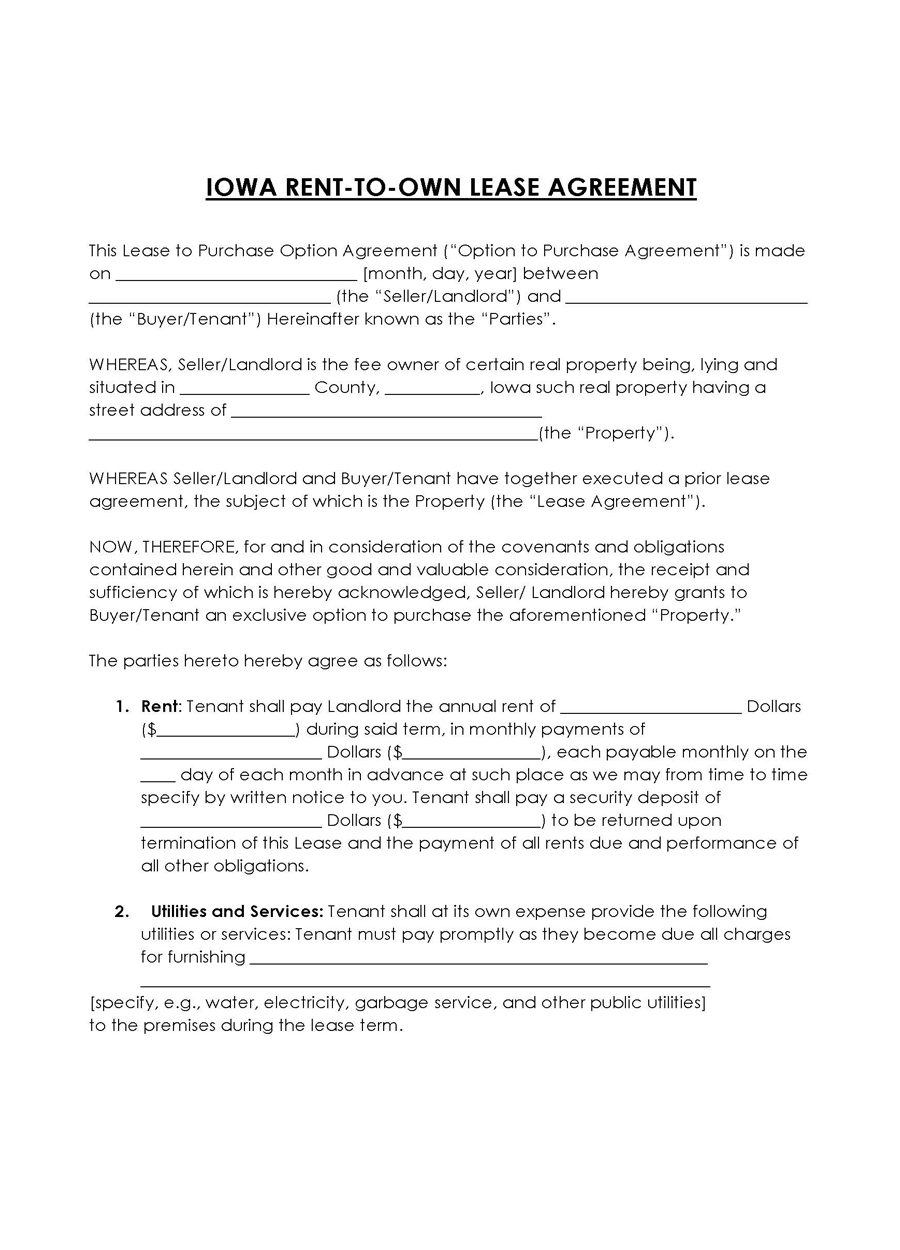
A rent-to-own lease agreement is a unique document that grants the tenant the ability to purchase the property they are renting. This agreement will include the same terms and conditions as a routine rental document. But still, additionally, it will also detail the proceedings for the capacity to purchase the property. While the tenant isn’t required to purchase the property, they are given the option to do so. If the tenant does not choose to buy it, the contract will end like a standard lease agreement. These agreements will have the same screening process as any other agreement, including examining the renter’s credit score.
Roommate

A room rental agreement is typically created for tenants planning to become roommates on the same property. This arrangement contains numerous conditions and is often used to protect tenants from becoming liable for damages inflicted by their roommates. While these are held between roommates, only the tenant with a direct leasing agreement with the landlord may represent their interests. Likewise, if the primary tenant terminates the contract with the landlord, all parties must abandon the property.
Standard
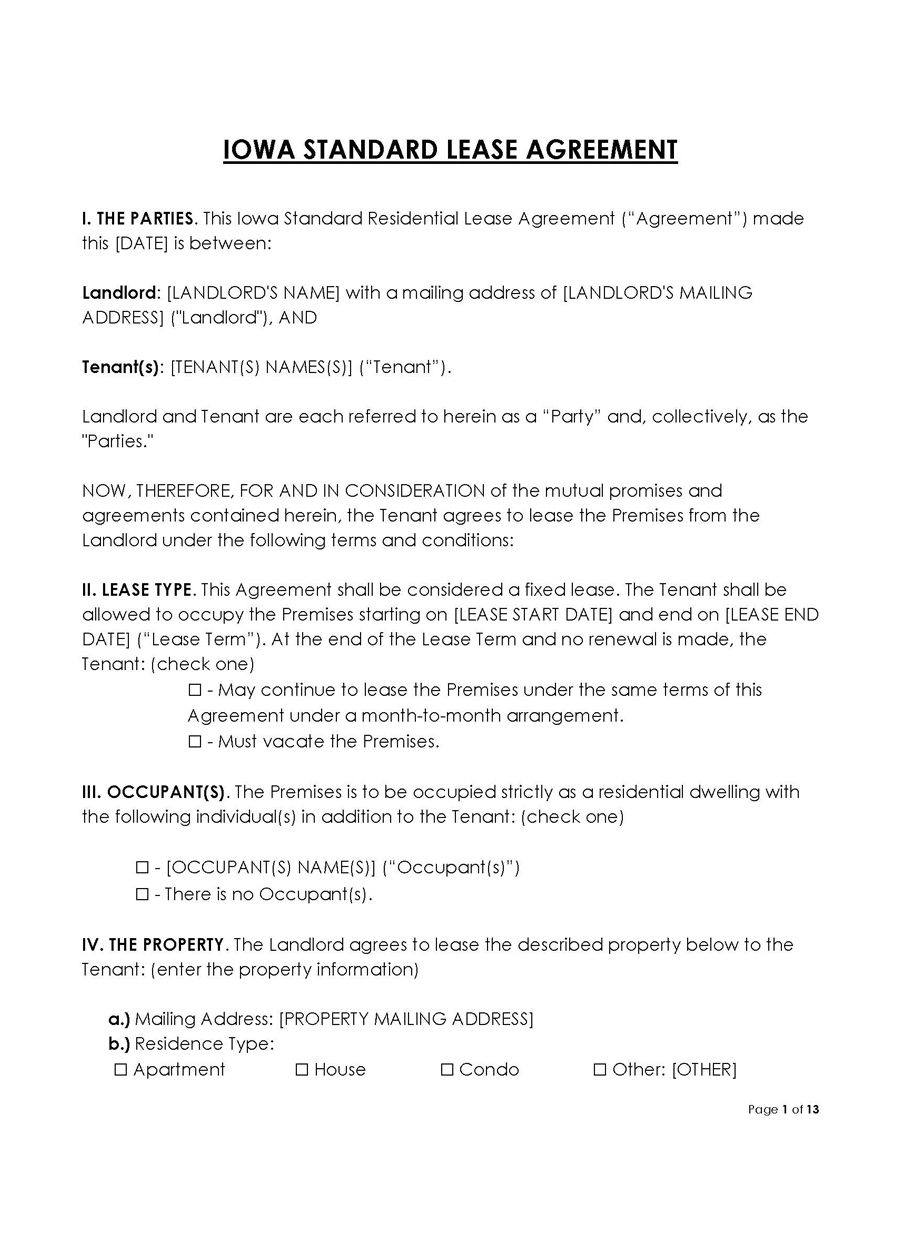
A standard lease agreement in Iowa is a formal contract that includes the terms and conditions of a tenant’s ability to use a landlord’s property. This binding contract will define all the requirements of the relationship and therefore, it is highly recommended that both parties have thoroughly read and understood the contract’s contents. Considering the goal of this agreement is to protect both parties, the tenant and the landlord must agree to all the conditions of the document and sign it. This standard contract is applied for a fixed amount of time and is one year. This type of contract is governed by Iowa state laws, such as Chapter 562A (Uniform Residential Landlord and Tenant Law).
Sublease
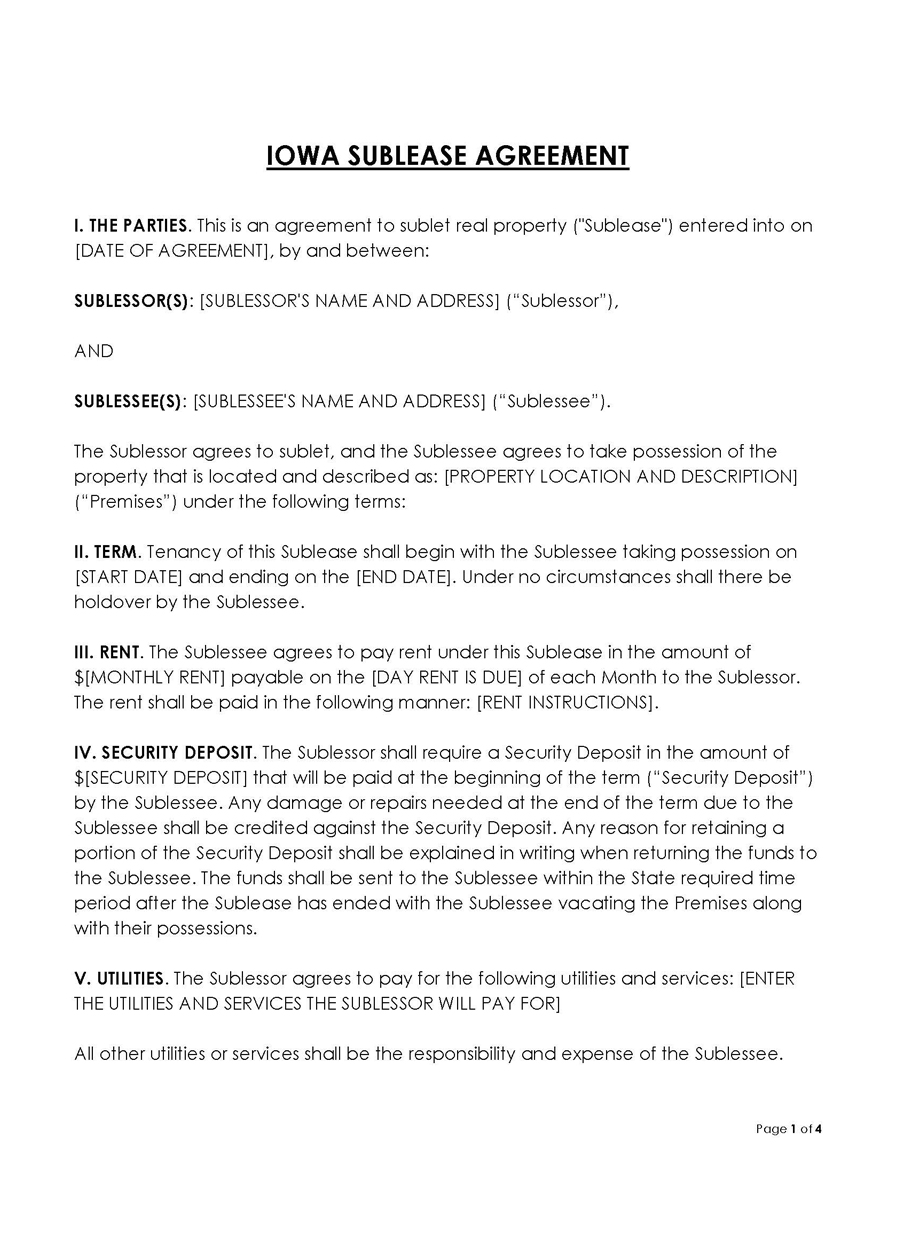
This distinctive agreement is a contract between a current tenant and a potential sub-tenant who will substitute them in the living arrangement. The current tenant, also known as the sub-lessor, remains responsible for the conditions outlined in the original contract with the landlord. However, the sub-lessee may reside on the property, abiding by the conditions outlined in both contracts. Additionally, the current tenant must receive written permission from the landlord. Likewise, the landlord is not required to maintain any conditions described in a sublease agreement if they exceed the conditions outlined in the original leasing contract.
Iowa Lease Agreement Disclosures
Within the definitive lease agreement in Iowa, several points are legally required to be clearly stated. These details ensure that every possible aspect of the living arrangement is covered and both parties are protected.
Some of the disclosures that must be included are:
Agent/landlord identification
According to § 562A.13, the full names and addresses of the landlord and any agents authorized to act on their behalf must be listed in the contract. In addition, their business address must be provided so that legal notices may be sent to them should the case arise.
Lead-based paint
Within the USA, federal laws call for all landlords to inform their tenants of the possible presence of lead-based paints, specifically for any home built before 1978. As lead-based paints may cause damage to a renter’s health, the landlord and any manager must dutifully inform them of their presence.
Shared utilities
If multiple tenants share the same utilities within the same property, it must be specified how they are shared and how the bill is calculated. This will allow the tenants to understand how they are being billed and at what rate. This stipulation is outlined in Iowa law § 562A.13.
Environmental response compensation and liability information system
According to the state of Iowa, tenants must be informed if the property is listed in this specific database. This is mentioned in § 562A.13 and specifically mentions this federal database produced by the Environmental Protection Agency.
How do I Write an Iowa Lease Agreement?
All lease agreements in Iowa ought to be written in a way that complies with all relevant legislation for the state. Therefore, several critical components have to be included in the document to ensure it follows the regulations.
Identifying information of the parties
The complete names of the landlord and all occupants must be registered. In many cases, this might be the residential property administration’s company name instead of the proprietor’s name. The respective address of the leased property also needs to be discussed within the lease agreement. This address needs to mention all appropriate information and contain any lot numbers.
Term information
Whether the agreement is a month-to-month or an annual agreement must also be expressed. In addition, the days when a lease will start and finish must be specified within the document.
Rent amount
Another crucial piece of the rental agreement is the value of the monthly rental fee that needs to be paid. Again, the contract should define the dollar amount, the date when it has to be paid, an address to pay the amount to, and any late costs that may apply.
Security deposit and initial payments
Frequently, a property manager might ask for several payments upfront before ceding the building to the lessee. Down payments, as well as initial deposits, are typical examples of this. The agreement must specify the quantity and terms of such settlement if a property owner asks for a refundable security deposit that may be utilized to pay for any prospective damages.
Additionally, a property owner might request a preliminary payment before allowing a tenant to move in. This indicates the agreement should describe the first month’s rental fee, the security down payment, and the total quantity due upfront.
Occupants
While property agreements have to state the names of all occupants, including minors, commercial contracts need to detail how the property will be used. These terms should also be appropriately shown regarding the lease payments.
Utilities
Other vital elements to consider in the paper are the utilities, which might or might not be included in the cost of the rent.
Parking
Furthermore, details such as parking conditions should be mentioned. For example, if a tenant is marked as a reserved place, that must also be pointed out.
Furnishings
Next, anything about particular home furnishings within the home should be mentioned. The property owner should specify which home appliances are allowed and if a tenant is to bring their appliances.
Additional terms
Any specific terms relating to the residential property’s abandonment conditions must be noted. How a renter or landlord should suitably give notice to the other, possible eviction procedures, and additional terms that both parties agree to. All of these ought to be explicitly stated to ensure that both parties acknowledge proper conduct. Later on, the document has to be signed and dated by every person involved in the contract.
Landlord-Tenant Laws
There are multiple laws that both the landlord and the tenant must abide by during this professional relationship. This creates an appropriate living arrangement for the tenant and an effective professional process for the landlord.
Some of the most important laws to keep in mind are:
Security deposit
A lease agreement in Iowa instructs that a landlord may only set up to two months’ worth of rent as a security deposit, as established in § 562A.12. In addition, the security deposit should be returned to the tenant within 30 days of vacating the property, as noted in § 562A.12(3)(a).
Right to enter
If a landlord desires to enter the property, a 24-hour notice is required to be given to the tenants. This requirement is established in §§ 562A.19(3). The property owner may only enter the location during reasonable hours. However, they can enter the property without any notice in emergencies, as noted by §§ 562A.19(1).
Iowa Lease Agreement
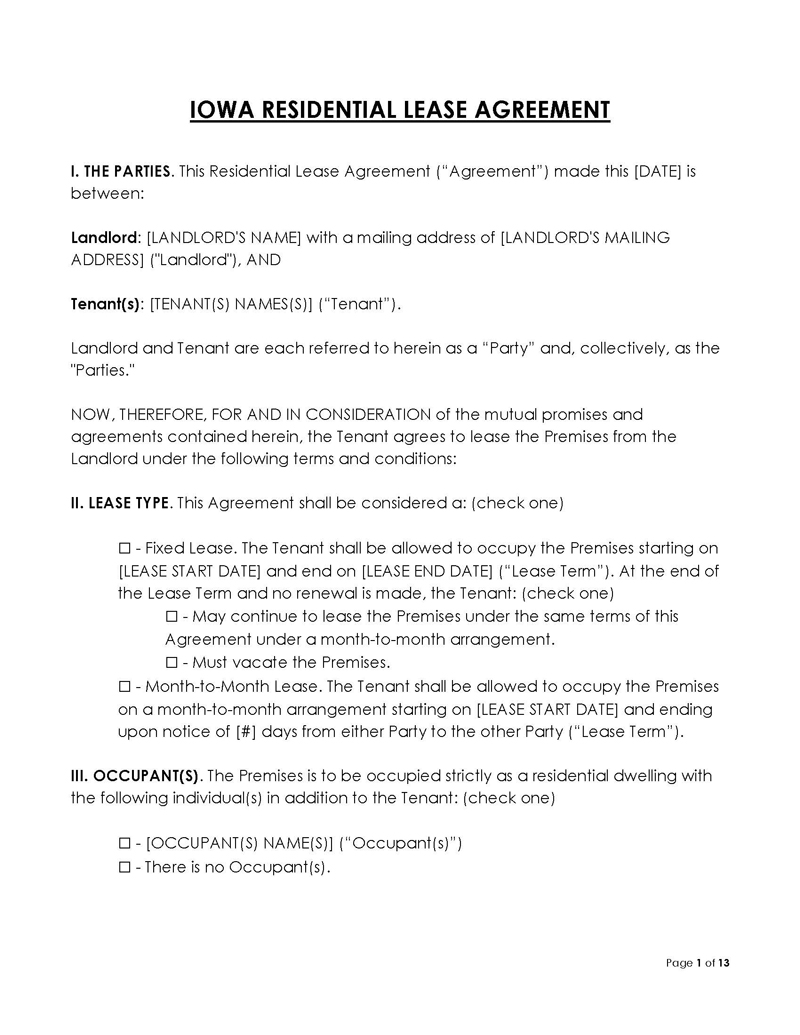
Final Remarks
A lease agreement in Iowa is an essential legal document that clearly outlines the terms and conditions of a potential tenant-landlord relationship. The Iowa State Law Chapter 562A (Uniform Residential Landlord and Tenant Law), describes all applicable conditions that the rental contract must comply with.
The maximum duration of any standard lease agreement is one year, in the case of residential contracts. It should also be noted that these are legally binding documents. Once both parties sign the contract and the tenant moves in, both parties are held responsible for its terms for the duration of the document’s validity. Finally, the lease agreements do not need to be notarized in Iowa. As long as the document is legally sound, the only requirement is for all parties involved to sign and date it.












